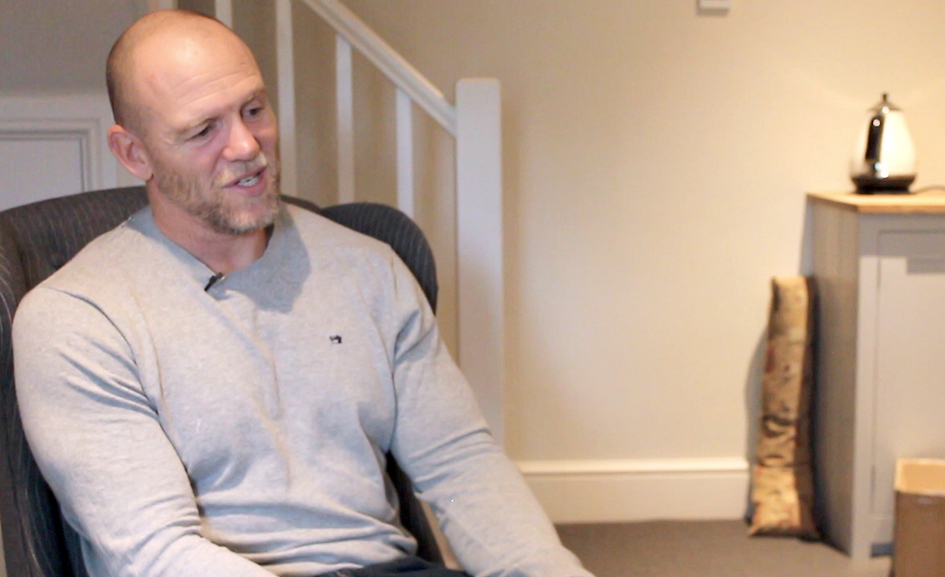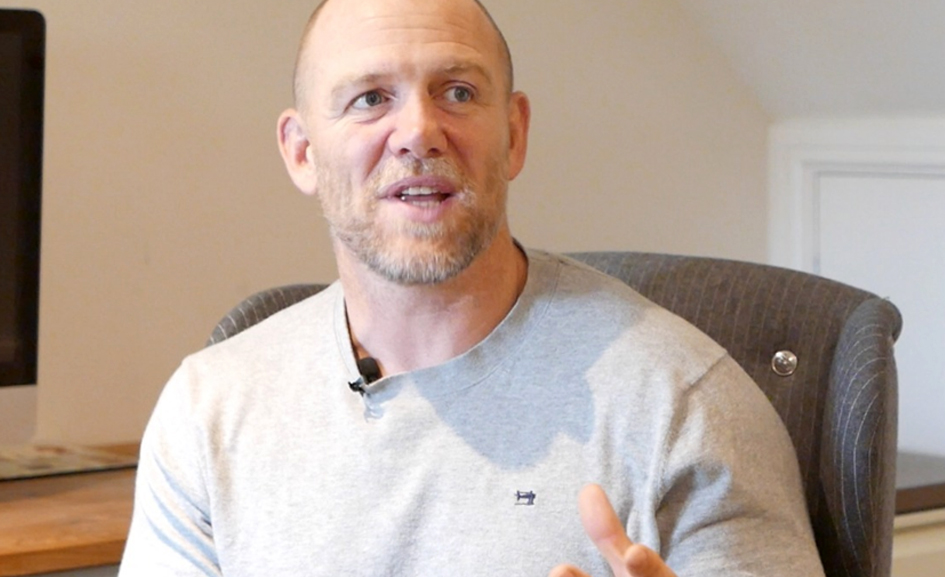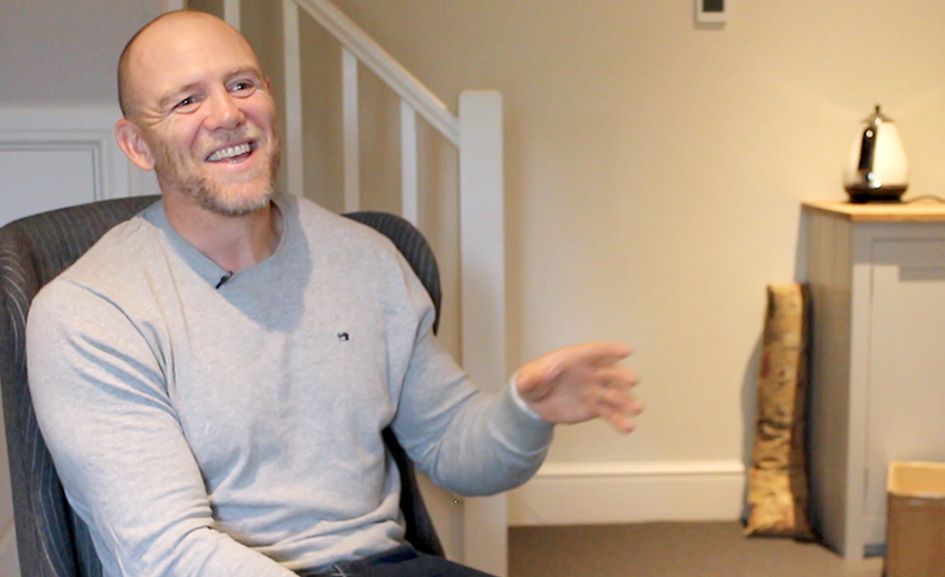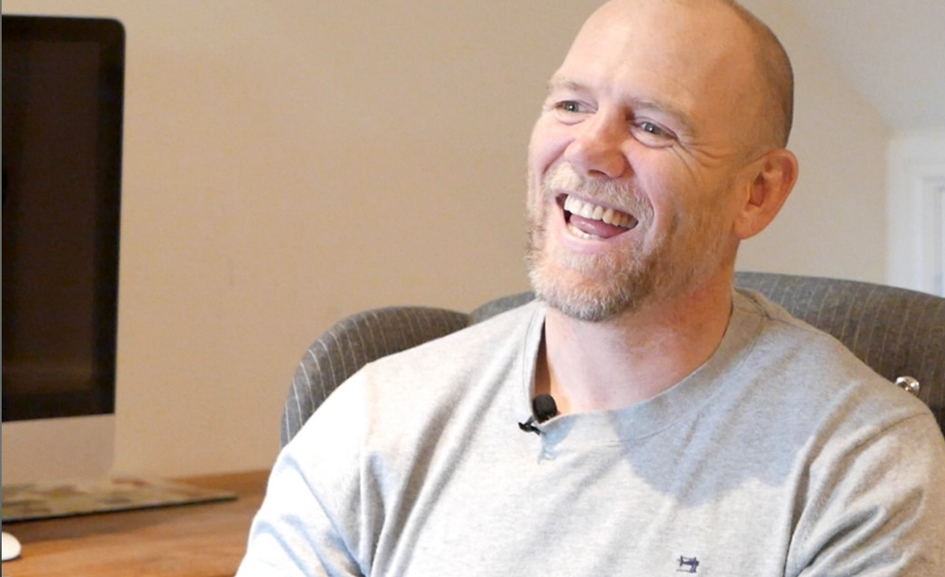Mike Tindall, a former England Rugby captain and World Cup winner, has spent the last decade or so lending a huge amount of support to the Parkinson’s community after his dad was diagnosed 17 years ago. One of Mike’s aims is to share stories and coping methods to aid the Parkinson’s community, similar to what we try to do with these blog posts.
He was kind enough to sit down with us and chat about his own response to his father’s diagnosis, how that’s changed over time and how this led to his engagement with Parkinson’s charities. He also explores the importance of the family dynamic in supporting someone with Parkinson’s.
The first time Mike found out about his dad having Parkinson’s was during the Rugby World Cup in 2003, when Mike was about 24. He was on tour in Australia at the time, and his parents came to visit, telling him and his brother off-hand over a cup of coffee. His dad had been having problems, particularly with small, cramped writing for a couple of years. Being “a typical northern bloke”, as Mike says, it took him that long just to go and see someone about it, which ultimately led to his diagnosis with Parkinson’s.
With a busy working life that often had Mike away from his parents’ hometown, the only chances they’d had to chat over the recent years was during the odd visit to a rugby game. As such, when his parents gave him the news in Australia, it was the first he’d heard about his father’s difficulties.In the early stages of his father’s diagnosis, he had few immediately obvious symptoms (he remains relatively unaffected by tremors to this day). This, and the fact that they would only see each other 15 or 20 times a year meant that although the news initially came as a surprise, Mike remained “fairly blasé about it for the next 6 or 7 years”.

Of course, Mike immediately looked into Parkinson’s, but the people who came up – Muhammad Ali for example – seemed so removed from what he saw in his dad that he didn’t take what he saw too seriously. This, plus the fact that he had his own thriving career to think about meant that he remained somewhat disengaged during those first few years. It’s something he regrets now; “I feel that if I’d have taken more notice then, I could have made him get on top of staying physically fit and in shape – but that’s all hindsight because it’s the knowledge that I have now that might not have been there in 2003. I wish I’d paid more interest in what was going on with Parkinson’s and done a little bit more research back then.”
Mike’s parents similarly had fairly little knowledge about his father’s new diagnosis. “Even now he still doesn’t have a great understanding of Parkinson’s!” Mike jokes, “He knows how it affects him though…One thing you quickly find out about Parkinson’s is that every case is very much different and individual, and so that’s why it’s very tricky”.
When it came to his father’s reaction, it was perhaps unsurprising given he had all but ignored his symptoms for the two years prior, that he didn’t really make a fuss about it. However “in not making a fuss about it he doesn’t help himself”, Mike adds sagely. While to him it might have felt that he was moaning or being dramatic, no-one would have judged Mike’s dad for taking an active interest in tackling his Parkinson’s. For example, it’s often advised for people with a recent Parkinson’s diagnosis to join a choir to keep the voice strong and prevent it fading, a common symptom that develops over time. Mike’s dad’s voice is now noticeably quiet, to the point where it’s difficult to hear him over a phone call. “Would that have been different if he’d been able to plan about it?” Mike wonders now. He laments that much of what he thinks about his dad’s Parkinson’s now is framed by “what if we’d done something different five or six years ago?”. It’s frustrating, and not all that helpful, but it also drives him to spread his story to the benefit of those who are now in the position that he was in 2003.
What changed?
In 2011, Mike and his wife got married. Sadly at their wedding, Mike’s dad was “in and out of a wheelchair for the whole thing”. This was because of an operation on his back that he’d had around the time to tackle another symptom of his Parkinson’s; curvature of the spine. This was quite a blow to both Mike and his father. While his back kept him relatively immobile, Mike’s dad became quite inactive and lost a lot of muscle mass. As Mike put it, “lack of exercise is the biggest no-no in Parkinson’s”, and it led to his other symptoms getting worse as he became less able to physically fight them. Meanwhile, as Mike watched his father’s health decline rather abruptly, he became painfully aware of the impact that Parkinson’s can have if allowed to; “You can enter a sort of downward spiral if you don’t make sure to keep on top of it all”.
Further bad luck with two gut-related hospital trips and a third after falling and fracturing his hip due to a rather too-early discharge from his first stay further impacted Mike’s dad’s health, causing him at one point to lose 4 stone over 6 months. Thankfully, he has fought through it all and is doing alright today, but for Mike, the experience threw his father’s situation into sharp relief and prompted him to take a more active role in helping, as well as taking much greater notice of Parkinson’s in general.
 As well-meaning and prudent as his attempts to help his dad are, they are not always appreciated. As with any well-intentioned advice or nudges you might try and impress upon a family member, and particularly a parent, Mike’s attempts to innocently help his dad out have been met with some resistance. “What can be frustrating for anyone with a family member with Parkinson’s is how receptive they are. My mum and dad; not particularly receptive” he says with a wry smile. It can sometimes feel like an uphill struggle when they think they know best and are very rigid in their approach to things. “It’s about drip-feeding them things step by step… at the end of the day quality of life is the most important thing”. Although they’re sometimes reluctant to give Mike’s suggestions a proper try, it’s important that he doesn’t become disheartened as there are sometimes breakthroughs. For example, Mike has recently convinced his dad to try a novel sleep aid which thankfully in his case has “completely changed his sleep”.
As well-meaning and prudent as his attempts to help his dad are, they are not always appreciated. As with any well-intentioned advice or nudges you might try and impress upon a family member, and particularly a parent, Mike’s attempts to innocently help his dad out have been met with some resistance. “What can be frustrating for anyone with a family member with Parkinson’s is how receptive they are. My mum and dad; not particularly receptive” he says with a wry smile. It can sometimes feel like an uphill struggle when they think they know best and are very rigid in their approach to things. “It’s about drip-feeding them things step by step… at the end of the day quality of life is the most important thing”. Although they’re sometimes reluctant to give Mike’s suggestions a proper try, it’s important that he doesn’t become disheartened as there are sometimes breakthroughs. For example, Mike has recently convinced his dad to try a novel sleep aid which thankfully in his case has “completely changed his sleep”.
Mike’s also found that he tends to have much more success convincing his dad to pursue exercises or activities if there is some form of competitive element; “It’s got to have some kind of purpose or be a game – if someone asked him to play table tennis ‘he could stand there all day playing against them”. This trait could well be a result of his time spent as a rugby player and coach. However, Mike notes that the medication has had an impact on this too. One common side-effect of Parkinson’s medication is an increased propensity to become somewhat obsessed or addicted to things. Although this side effect can be alarming and even damaging, if properly managed it can be used to your advantage, as in Mike’s dad’s case. Prior to lockdown he was regularly playing ping-pong with people at his local gym and finding it a great way to get regular, gentle exercise that didn’t feel like a chore. “That’s what he needs; he needs a challenge or something with a high score he needs to beat”.
“Ultimately they’re still their own person”
As important as it has been to support his father, it’s important to appreciate that he is still very much an active-minded individual, and naturally does not want to be limited by his Parkinson’s. Taking his medication on time, something both he and his family know to be extremely important is sometimes still a struggle much to the frustration of Mike and his mum. Often he will become so absorbed in whatever he’s doing that he’ll ignore his medication alarm, even if medication is right there in front of him, and a couple of hours later his symptoms will be so bad that it will ruin the rest of his day. It ties in to his long term love for doing things himself, Mike says. “He’s ridiculous, he does loads of stuff in the garden that he shouldn’t do – like, ‘you should NOT be using a hedge trimmer!’”.

You can offer to help him doing something dangerous, or to get someone in to do it for him, but “he’s never going to not do this stuff; you tell him to stop and he’ll stop, just to come back to it later”. In these situations, Mike’s found it’s best to offer help where possible, but has come to accept that his father’s task-focused mind will never permit him to truly drop something once he’s started. “Ultimately don’t get frustrated if they don’t take it because it’s still their life. As much as you try to force change on them if they don’t want to change there’s nothing you can do about it.”.
We must remember how much of a struggle coming to terms with a Parkinson’s diagnosis is, let alone how hard keeping to a strict exercise and medication regime is on top of that. Mike’s dad has always taken pride in independence, and so frustration at a sudden inability to perform even basic tasks himself can manifest as stubbornness. For example in the earlier stages of his Parkinson’s when he was just starting to lose some dexterity, he would insist on buttoning his shirts himself, refusing help even when it would take him the better part of an hour to get dressed. “If I let someone help me with this then what does that lead to?” Eventually, he realised that allowing people to help wasn’t an admission of weakness or the beginnings of laziness. He has since accepted that using popper buttons and asking for help when required is sensible, but it’s a conclusion that Mike’s dad had to come to himself, over time.
Getting involved with charity
“My brother and I have sometimes let frustration get the better of us, but we’re so far down the line now that we’ve come to realise it’s not worth getting angry. If they’re happy doing what they’re doing you’ve got to adapt to that, and that’s why you might end up getting involved in a charity that’s finding a cure rather than spending all your time chasing them around”. As you may know Mike is very active in raising both money and awareness for Parkinson’s. He started off “doing bits and pieces” like donating the £25,000 winnings from a charity poker tournament to Parkinson’s UK. His close involvement didn’t truly start until he met Tom Isaacs, the late founder of the Cure Parkinson’s Trust, at a Parkinson’s golf day in 2014. “He had really strong dyskinesia, shook all over the place, couldn’t walk but as soon as he stood to address over a golf ball everything switched off and he could stand dead still. And then as soon as he hit it all bets were off again… he was just such an infectious guy”. Mike developed his engagement with Parkinson’s over the following years, setting up his own charity golf day. “Tom really affected everyone who came to the golf day. He had very bad sleep problems, so how he was during the day was made all the more impressive by what he had to go through at night. He’s driven my passion for getting involved and seeing what’s out there and doing what I can to raise money and also raise awareness of what’s going on in the medical world looking for a cure”
As a patron for the Cure Parkinson’s Trust Mike’s passion for the search for a cure is evident. His knowledge of the current medical landscape – what drugs and therapies are being trialed where, by who and at what stage – is staggering. There’s a palpable frustration at the slow rate of progress, bureaucracy and frequent abandonment many of these trials face; “even if something only helps 2 out of 100 people then you’re still changing 2% of people with Parkinson’s lives and surely that is worth doing…”. He tries to remain optimistic and support the incredible work charities like Parkinson’s UK and Cure Parkinson’s Trust are undertaking along with long lists of international collaborators in every field. He does what he can to raise awareness through events like his golf day and the recent trans-Alpine charity cycle ride he hosted (replicated virtually on his home turf due to lockdown), as well as by sharing his message through public engagement like this, for which we’re all very thankful!
The importance of family
For Mike’s dad himself, life is fairly up and down. He suffers quite badly from shuffling and freezing, which is likely exacerbated by previous leg and hip injuries. Larger, more powerful movements like climbing the stairs aren’t so much of a problem, but finer movements are tricky and he’s frustrated by what he can’t do. He’s had his fair share of complications – in fact over the course of his most recent gut operation, failure to administer his Parkinson’s medication on time sent him into a sort of Parkinson’s coma from which it was very difficult to recover. That he’s been able to fight on for these last 17 years is doubtlessly thanks to all the love and support from his family. Thankfully, Mike’s relationship with his dad hasn’t been affected too much by it all, “of course you feel the roles reverse a little bit… whereas before he was checking up on me now it’s me saying ‘hope you’re taking your medication? Have you done any exercise today?’”. Mike’s mindful of his dad’s personality and knows when to be firm and push things, but also when not to; “You keep plugging away,” he chuckles ”chipping, chipping…”.

One very important figure we’re yet to properly mention is of course Mike’s mum. As the person who lives with Mike’s dad 24/7 and sees all his ups and downs, “it’s been pretty hard on her”. Having been together for over 60 years now and “being the sort of Northern Lass that she is” she feels a strong duty of care towards her husband. Mike and his brother try to remind her that she’s not a carer; “if you break, either from the stress or if you’re pulling him off the floor or out of a chair and you go down and you can’t look after him then you’re both buggered”.
They’ve suggested bringing in someone to look after him for a few hours every so often to give her a much-needed chance to get out and have some time to herself or with friends, but there’s always some reason that she’s reluctant to. “I think she feels she needs to shoulder it all herself, and it’s draining for her. Some days she’ll ring up and say things aren’t going so well, but then others she’ll say he’s been great. If they manage to get out at all now it’s the best thing ever”. Part of Mike’s duties in looking after his dad, it seems, is providing an outlet for his mum’s venting. “She understands it’s tough for him, but I think sometimes she gets frustrated that he doesn’t understand that it’s tough for her too, and sometimes it’s tougher for her than it is for him.” Mike just listens and gives his opinion on things and if he thinks his mum’s in the right then he’ll tell her, and provide a bit of moral support. It’s tough to have a family member who feels they always need to take that caring role, but Mike reckons it’s always important to try and give them time off where they can forget about it for a while and live their own life again.
The Tindall family network is tight knit, and they do their best to work together helping Mike’s dad. “He was an absolutely unbelievable father,” Mike says. Also a rugby player, Mike’s dad playing with and coaching him from a young age was an important part of what led to Mike’s success on the pitch. “And now with the grandkids, you’re beginning to see that side of him again”. He loves to play with Mike’s 6 and 7-year-old daughter and niece, but sadly when it comes to Mike’s 2-year-old, “you can see he’s a bit more nervous, scared he’s either going to topple over or drop her or something”. However, Mike reckons his grandkids are a big part of what keeps his dad going these days, so he can’t wait for COVID to ease off enough that he’ll be able to see them in person again.
Thank you to Mike for being so welcoming, for sharing his story with us and for being such an incredible figure in the fight against Parkinson’s disease.